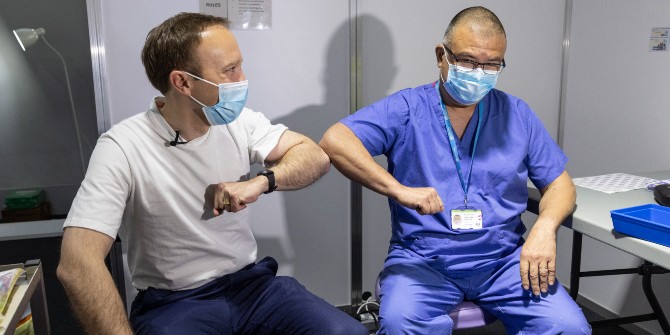Adam Oliver (LSE) argues that behavioural scientists should leave the judgments on which pandemic interventions ought to be introduced to those appointed to balance all relevant considerations. Instead, they should focus on assessing how the interventions might be made more effective.
In the UK government’s response and media reaction to the pandemic, behavioural scientists were consulted extensively, and occasionally maligned. The criticism of behavioural scientists has sometimes been deserved. For example, the credibility of behavioural science took a hit at the start of the pandemic due to proclamations from some within the field that people might have been overreacting to the possible threat of COVID.
In fact, there are good behavioural science-informed reasons to suggest that people were overreacting, just as they had overreacted to the threat of swine flu a decade ago. For instance, ambiguity aversion over uncertain events might lead to a tendency to believe that the worst is likely to happen, the availability heuristic may cause people to place too much emphasis on what is happening elsewhere or in the recent past, and cascade effects might cause fear to spread quickly throughout a population.
However, there are also good behavioural science-informed explanations that partly explain why people may under-react to a pandemic threat, including overconfidence that the threat will prove unfounded, loss aversion associated with the negative consequences of attempts to mitigate the threat, and, again, the availability heuristic working in the opposite direction to that suggested above if the consequences of recent pandemics proved mild.
Behavioural scientists study human behaviour, which is complex, with different phenomena driving people in different directions, and with even the same phenomena driving people in different directions depending on timing and context. When it comes to assessing the possible threat of a pandemic at its beginning, behavioural scientists simply cannot predict with any degree of accuracy whether or not people are over or under-reacting. That said, behavioural scientists do have a potentially important role to play in any present and future infectious disease pandemic response, but first I will expand a little on those aspects of a pandemic where their advice is perhaps a little more circumspect.
Scientific expertise is normally focussed within very specific domains, and yet the relevant outcomes – health, social, and economic-related – of an event such as a pandemic involve considerations that extend far beyond the range of any individual’s area of competence. The pronouncements from a behavioural scientist on whether a government ought to impose policies with such far reaching implications as a national lockdown should thus be treated with a healthy degree of scepticism. To use an analogy, if a person experiences a problem with his or her car and doesn’t possess the skills to fix it, s/he will seek the expertise of a motor mechanic. However, this does not mean that a mechanic has the requisite skills to manage General Motors effectively.
The behavioural scientists advising the UK government and those solicited for their views by the media on what often appears to be an almost daily basis, are principally health and social psychologists, who have tended to weight the direct (potential) health consequences of the pandemic far more than the health, social, economic, personal financial/livelihood, and liberty-related consequences of the responses to the pandemic, often showing little appreciation of the latter at all. Admittedly, the focus on the immediate health impact of the pandemic is a powerful narrative, more powerful than the fallout from the probable consequences of the responses to the pandemic that governments and the citizenry will have to deal with for years to come, although this power imbalance may change as more people tire of being constrained.

In tackling an event with important multifarious considerations, the most appropriate person to sit in judgment in deciding the correct course of action is therefore someone who can balance the different specific single (or at least limited) consequences to which different experts tend to attach all weight. Of course, the siloed forms of expertise serve as crucial inputs in these deliberations. The experts in the various camps may disagree with the decision-makers’ overall assessments and judgments (partly because, as noted, experts are drawn, by the nature of their expertise, to particular and differing considerations), but if the decision makers have considered the relevant implications seriously that is all that can be asked of them. We may question whether the perfect model of a trusted Periclean or Lincolnian public servant anymore anywhere exists, but turning to those who see only half, or less, of the full picture is not the answer.
My suggestion is for behavioural scientists to leave the judgments on which interventions ought to be introduced to those appointed to balance all relevant considerations, and instead focus on assessing how the introduced interventions might be made more effective with input from their knowledge of behavioural science. There are, of course, many domains of policy – indeed, perhaps all domains of policy – where behavioural science expertise can be usefully deployed in this way, including in relation to interventions intended to get the economy moving again, in securing volunteering behaviours to help the vulnerable, to encourage people to report and escape from domestic abuse, etc. But in terms of assessing policy effectiveness, perhaps the most visible ways in which behavioural scientists have thus far been involved in the pandemic response is in relation to interventions intended to limit the spread of, and enhance resistance to, the virus: i.e. handwashing, social distancing, mask wearing, voluntary testing, and vaccine uptake.
It is not my intention here to review the behavioural interventions that have been designed, tried, and tested for the purposes of improving the policy responses to the pandemic – it is merely to contend that this is where, in relation to a pandemic, behavioural scientists can most appropriately apply themselves. Moreover, behavioural scientists won’t offer a panacea. The essence of ‘behavioural public policy’ – the term that is now used to encapsulate the application of behavioural science to public policy design – is that context matters to the effectiveness of any intervention. Behavioural scientists are likely to be able to help only at the margins, but even at the margins many illnesses might be prevented, and many lives might be saved.
This post represents the views of the author and not those of the COVID-19 blog, nor LSE. It first appeared at LSE British Politics and Policy.





